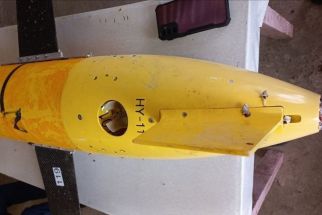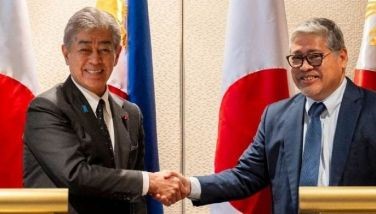Asean pushes sea code, talks with China
BANDAR SERI BEGAWAN — In sharp contrast to what transpired at last year’s summit, Southeast Asian leaders agreed yesterday to initiate talks with China over sea disputes as well as push for a code of conduct to govern maritime issues.
The Philippines has been urging the Association of Southeast Asian Nations (ASEAN) for years to engage China in discussions regarding territorial spats in the West Philippine Sea and South China Sea.
Brunei, Malaysia, Vietnam and Taiwan – aside from the Philippines – also have claims in the vast South China Sea. China’s claim practically covers the entire South China Sea including other countries’ coastlines.
At last year’s summit, host Cambodia would have gotten ASEAN to adopt China’s position to limit talks on territorial issues to the bilateral level had it not been for President Aquino’s strong objection.
This year’s ASEAN chair, Brunei, put the issue high on the agenda right from the start of the summit.
“We would like all parties concerned to seize the current positive momentum and to reach an agreement on the Code of Conduct. And we all agree to encourage continuing discussion, dialogue, and consultation in all levels especially among claimant countries and to keep the lines of communication open,†Sultan Hassanal Bolkiah said.
Bolkiah said they also “stressed†the need for a full and effective implementation of the Declaration on the Conduct of Parties in the West Philippine (South China) Sea between ASEAN and China.
President Aquino told reporters that the talks on the South China Sea were moving in the “right direction†and that he was thankful that ASEAN leaders found a common ground during the working dinner hosted by the ASEAN chairman.
“Our host – the Sultan – brought up the topic of the South China and the disputes, carrying the need to maintain a calm and peaceful resolution of the topic, sober dialogue,†Aquino said in a briefing at the Philippine embassy Wednesday night. Aquino arrived in Manila from Brunei yesterday afternoon.
In a statement wrapping up the summit, Bolkiah said they discussed the situation in the West Philippine Sea and reaffirmed the importance of peace, stability and maritime security in the region.
“We have agreed on what I see as a two-step approach. Firstly, the overlapping claims are for the claimant states to deal with. Secondly, both ASEAN and China wish to promote a calm and peaceful atmosphere and to urgently work on the Code of Conduct,†Bolkiah said in a press briefing at the Prime Minister’s Office at the end of the summit.
“In my view, it is important to have in place practical procedures which could assist in avoiding undesired incidents at sea. For instance, if there is a major storm, fishermen may need to take temporary shelter in disputed areas. Such innocent incidents may be misinterpreted and, therefore, it would be appropriate to have established procedures, for example, having hold lines to avoid misunderstandings,†Bolkiah said.
“I personally have held a number of consultations with concerned countries on this matter and I would continue to do so in the coming months,†he said.
Last year, the ASEAN member-countries had to struggle with perceptions of disunity after Cambodia, a known ally of China, was rebuked by the Philippines for trying to downplay the West Philippine Sea issue despite increasing tensions due to Beijing’s nine-dash theory claiming the whole of the disputed area.
In the chairman’s statement, the ASEAN leaders underscored the importance of the DOC, ASEAN’s Six-Point Principles on the South China Sea and the Joint Statement of the 10th Anniversary of the DOC.
“In this regard, we reaffirmed the collective commitments under the DOC in ensuring the peaceful resolution of disputes in accordance with universally recognized principles of international law, including the 1982 United Nations Convention on the Law of the Sea, without resorting to threat or use of force, while exercising self-restraint in the conduct of activities,†the statement said.
“We look forward to continued engagement with China in implementing the DOC in a full and effective manner, including through mutually agreed joint cooperative activities and projects,†it added.
Aquino said Cambodian Prime Minister Hun Sen did not make any intervention on the matter during their working dinner. China does not want to internationalize the issue by going to groupings like the ASEAN or the United Nations.
The Philippines’ major concern was China’s incursion in Panatag (Scarborough) Shoal, where Chinese ships have remained since a standoff with Filipino vessels in April last year.
China’s latest naval deployment in the region had also enraged other Southeast Asian countries. Last month, China sent four warships to land troops on its southernmost claim - the James Shoal, 80 km (50 miles) off the Malaysian coast and close to Brunei.
Tensions are likely to tick up again in coming months, as monsoon weather eases and China imposes a unilateral annual fishing ban that has irritated Vietnam and the Philippines.
Frustrated with the slow pace of regional diplomacy, the Philippines in January angered China by asking a United Nations tribunal to order a halt to Beijing’s activities, such as those at Panatag Shoal, that it said violated its sovereignty.
Welcome development
“We should really be thankful that the whole of the ASEAN is willing to discuss this instead of putting it on the backburner. That, I think, is already a help,†Aquino said, although he pointed out that Cambodia’s leader might also intervene in some sessions.
“So I think it really went well. We were able to state our points with regard to arbitration and with regard to the COC. Then there seemed to be… it’s difficult to say there was already a consensus because we just began. Of course, the statement happens at the end of the whole process. But there didn’t seem to be any disputes while we were discussing the need for that COC,†he said.
The President said he had expected more exhaustive discussions on the issue during their sessions.
The President said they were focusing on “sober and calm approaches†and that “continuing dialogue, is already I think also the direction that we are taking.â€
“So we are thankful to all of the ASEAN member countries that we are putting this on the agenda and moving forward, especially since, isn’t it that when we last met that was already the 10th anniversary of trying to come up with a COC?†Aquino said.
“Isn’t it very encouraging that on the very first night here, on the very first meeting this was included among the topics? Our priority here is that… stability leads to prosperity,†he said.
“So our take is, let’s clearly define the Code of Conduct. And the others are saying anything – any disputes should be managed always on a peaceful manner through dialogue,†he said.
He said a binding COC would “at least ensure that there is no escalation of these disputes into things that might become bloody.â€
“So there is unity of purpose and one can always be hopeful that that will lead to something more concrete,†he said.
Presidential spokesman Edwin Lacierda, meanwhile, said the Philippines and Vietnam held bilateral talks on the sidelines of the summit.
He said President Aquino and Vietnam Prime Minister Nguyen Tan Dung were upbeat over “the progress of economic relations†between the two countries.
“Both leaders are happy with the progress of economic relations and discussed ways on how to further enhance these relations. Both countries acknowledged the improvement of maritime security between the two countries and Vietnam expressed support for the Philippines’ international initiatives on this matter,†Lacierda said.
Uncooperative
Analysts, however, said ASEAN’s calls for China to agree on a legally binding code of conduct for the sea would likely lead nowhere.
ASEAN and China first agreed to work on a code in 2002, but the Asian superpower has since refused to discuss it further.
“China was never enthusiastic about a code of conduct, as it does not want to sign an agreement that will constrain its sovereignty-building activities,†Ian Storey, a senior fellow at the Institute of Southeast Asian Studies, said.
Indonesian Foreign Minister Marty Natalegawa said ASEAN foreign ministers would hold talks with China on the issue during a scheduled event in Beijing later in the year. But officials gave no indication of whether there could be any meetings before then.
Bolkiah and other Southeast Asian leaders said progress had been made this week on the ASEAN Economic Community, and more than three-quarters of its framework had been agreed upon.
One of the other key issues on the agenda during the summit is pressing ahead with deeper economic integration within ASEAN, and other countries in the region.
The bloc is aiming to create a single market for the 10 Southeast Asian countries and its 600 million people – known as the ASEAN Economic Community (AEC) – by 2015.
More than three quarters of the blueprint for the AEC has been agreed upon but Aquino and others involved said the most difficult areas were yet to be addressed. Analysts say the 2015 deadline is unlikely to be met.
ASEAN, founded in 1967 as a bulwark against communism in the Cold War era, has often been caught in the crosscurrents of major conflicts. Currently, the bloc is walking a tightrope between a rising China and an America that is reasserting its status as an Asia-Pacific power.
Both wield tremendous influence on ASEAN, which has become a battleground for political and security clout and export markets.
Defense forces from all of ASEAN, along with eight other countries that include the United States and China, would hold for the first time three-day disaster response drills in Brunei in June to foster confidence among the multinational troops, the draft summit statement said.
Korean concerns
Meanwhile, President Aquino and fellow ASEAN leaders expressed concern over developments in the Korean peninsula and called for a “denuclearization†of the region.
The regional bloc issued its statement on the Korean issue at the close of the 22nd ASEAN Summit.
In a statement, ASEAN leaders called on North Korea to fully comply with its obligations under various United Nations Security Council Resolutions. The leaders also asked Pyongyang to fulfill its commitments under the Sept. 19, 2005 Joint Statement on the Six-Party Talks.
“We reaffirm our full support for all efforts to bring about the denuclearization of the Korean Peninsula in a peaceful manner as well as the early resumption of the Six-Party Talks,†the statement read.
“We emphasize the importance of dialogue aimed at promoting mutual understanding and confidence among all parties concerned to ensure peace, security and stability in the Korean Peninsula,†it added.
- Latest
- Trending





























